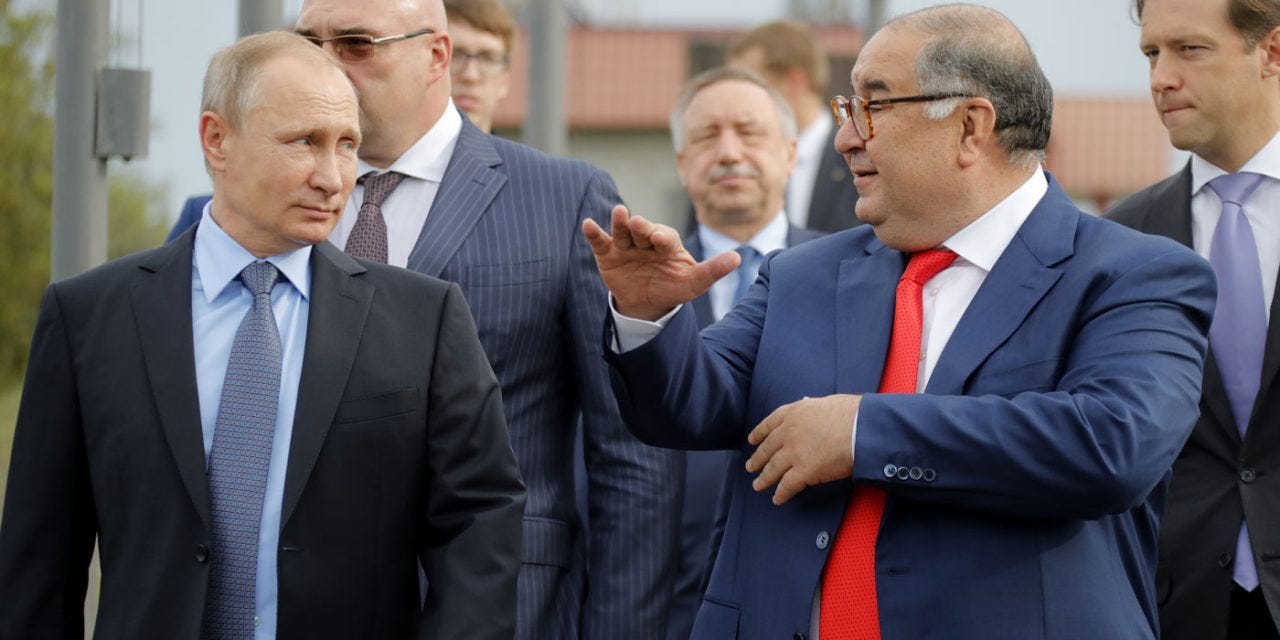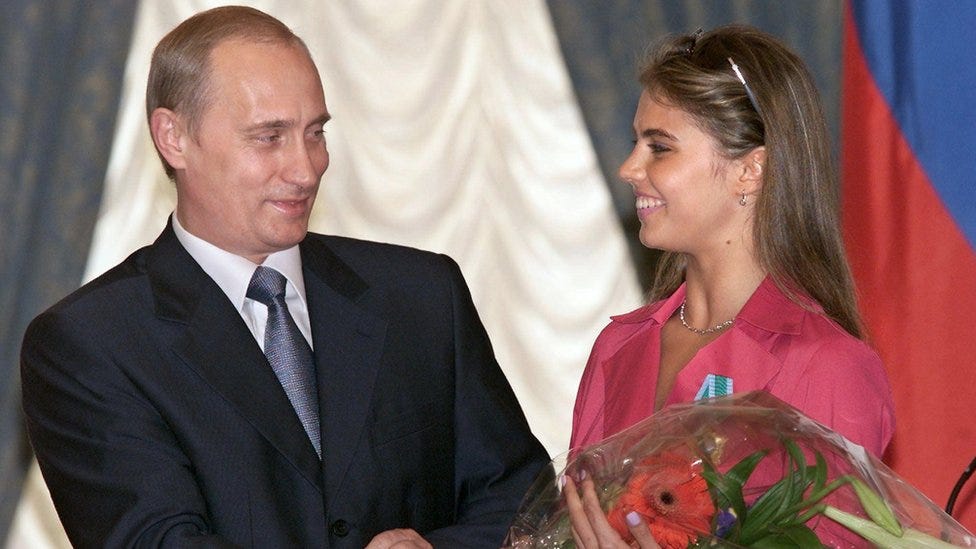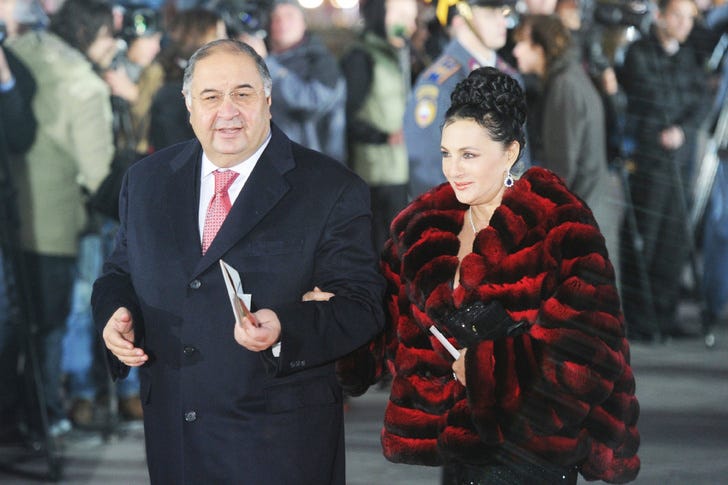The Paris Olympics have ended—the first Games from which Russia was barred. If you think this is solely the result of Western sanctions, you're only partly right. It’s also a consequence of Russian propaganda, which demanded that Russian athletes boycott the Olympics. Leading this charge was Irina Viner—the formidable and feared figurehead of Russian rhythmic gymnastics.
In Putin’s Russia, sports have always served a crucial role in state propaganda. For example, Olympic rhythmic gymnastics champion Alina Kabaeva, Viner’s best student has, long been rumored to be Putin’s secret wife and possibly the mother of his children. In the latest episode of my project "Tsardom," I will delve into story of Kabaeva and Viner, because it’s crucial to understand what is happening to in Russia in the wake of international isolation.
Two Queens
Two years ago, after Russia's invasion of Ukraine, international sanctions were imposed on the country. Russian sports found itself in isolation, and at the same time, a domestic conflict erupted between the two most powerful women in Russian sports. On one side is Alina Kabaeva, a former Olympic champion in rhythmic gymnastics and the rumored lover of Vladimir Putin. On the other side is her former coach, Irina Viner, the wife of one of Russia’s most influential oligarchs.
Viner, the head of Russia's rhythmic gymnastics federation, was so outraged by the sanctions against Russian athletes that she decided competitions in Russia would no longer follow international rules and established her own. It was a strange move, but typical of Viner, known for her authoritarianism and her belief that everyone else is wrong, and she is right. However, unexpectedly, Alina Kabaeva—Viner's most cherished pupil and the most powerful athlete in Russia—rebelled against her former mentor. Kabaeva decreed that in all competitions she organizes, Viner's rules would not be followed, and she introduced her own set of rules.
As a result, there are now three versions of rhythmic gymnastics in the world: the international federation's version, Irina Viner's version, and Alina Kabaeva's version.
Yes, it does resemble a form of madness, but there are economic motives behind this situation. Kabaeva wants to wrest control of a vast business from her former mentor. She aims to become the ruler of all Russian rhythmic gymnastics, the most influential woman in Russian sports, and seize the financial flows currently controlled by Viner. That both Viner and Kabaeva, through their actions, are exacerbating Russia's isolation and harming their own pupils by depriving them of the chance to compete on the world stage is something that clearly doesn't concern the two queens.
The Kabaeva-Viner rivalry is so fascinating that it could easily serve as the plot for a TV show.
A Romantic Beginning
French writer Alexandre Dumas, author of The Three Musketeers, wrote a novel called The Count of Monte Cristo. It tells the story of a young man who was falsely accused on the eve of his wedding and imprisoned. Later, he escapes, becomes fabulously wealthy, and exacts revenge on three villains responsible for his misfortune: a banker, a prosecutor, and a military officer.
In the 1960s, in the city of Tashkent, the capital of the Soviet Republic of Uzbekistan, there lived a boy named Alisher. He loved reading Dumas, with The Three Musketeers and The Count of Monte Cristo being his favorite books. He became so captivated by them that he took up fencing to emulate Dumas’s heroes. Little did he know that the story of his favorite characters would later play out in his own life.
But first, young fencer Alisher Usmanov met the beautiful rhythmic gymnast Irina Viner in the Tashkent sports palace. Usmanov would later claim that it was love at first sight.
Alisher belonged to the “golden youth” of Tashkent—his father was the city’s prosecutor, and in the corrupt Soviet system, this meant that the Usmanov family was part of the republic's elite. Alisher went to study at the most prestigious university in Moscow, during which time Irina married someone else.
In 1980, a clan war in Uzbekistan escalated, leading to a public crackdown on corruption. Almost like in The Count of Monte Cristo, the targets were a banker, a prosecutor, and a KGB officer. However, it wasn’t them who ended up in prison but their sons—three members of Uzbekistan's golden youth. Among them was the prosecutor’s son, fencer Alisher Usmanov, who was sentenced to eight years in prison.
Irina Viner, meanwhile, didn’t abandon her beloved; she waited for him. While behind bars, Alisher proposed to her, and she agreed.
Usmanov didn’t serve his full sentence. In 1986, the Perestroika began, a new wave of anti-corruption efforts swept Uzbekistan, and the victims of the previous wave were released.
In 1991, the USSR collapsed. In 1992, Alisher and Irina moved to Moscow, where they would become the country’s future power couple. She continued her career as a rhythmic gymnastics coach, while he ventured into business.
Alisher’s old connections proved useful—one of his former classmates became President Yeltsin’s press secretary. Usmanov began working at Gazprom, Russia’s gas monopoly, specializing in handling the most delicate (and obviously corrupt) requests from top management. Like the freed Count of Monte Cristo, he became fabulously wealthy.
His wife also achieved success—in 1996, at the Atlanta Olympics, one of her protégés won a silver medal.
This is where Dumas-style story would have ended. But in reality, it was only the beginning of a far darker drama.
In 2000, Vladimir Putin came to power in Russia. He soon attempted to take control of big business, starting, of course, with Gazprom, the gas monopoly. The company’s leadership wasn’t about to unquestioningly submit to the new president, especially since the state owned less than 50% of it. To gain control of the company, Putin needed an insider, someone who knew the inner workings well. That person was Alisher Usmanov.
They were brought together by the same former classmate, who had once been Yeltsin's press secretary and was now an aide to Putin. Knowing firsthand what it meant to lose everything, Usmanov decided to switch his allegiance to the stronger side, betraying his old patrons.
At Putin’s request, he began buying up shares of the company to hand them over to the state, securing a controlling stake. As a result, Putin was able to remove Gazprom’s previous management. Usmanov, in turn, went from being merely wealthy to becoming an oligarch, acquiring all the metallurgical enterprises that had previously belonged to the gas company.
Moreover, Usmanov became a member of Putin’s inner circle. It’s said that on Saturdays, when the president and his friends gathered at his country residence, Alisher would always prepare Uzbek pilaf for them.
Irina Viner also continued to expand her influence. At the Sydney Olympics, two of her protégés won medals. However, her favorite student, 17-year-old Alina Kabaeva, made a mistake and only won bronze, while the gold went to another Russian, her less favored pupil, Yulia Barsukova.
But soon, everyone would forget about the champion Barsukova, while the bronze-winning Kabaeva would become Russia’s biggest superstar.
The Tsar and his Woman
Alina Kabaeva never had a favorite book. From a very young age, her parents placed her in the care of Irina Viner, who didn’t foster a love of reading in her students. Alina’s life revolved around discipline, strict obedience, and relentless training. In the rare moments of rest, she enjoyed watching television, and her favorite movie was Gone with the Wind. Like Scarlett O’Hara, she might have vowed to do whatever it took to avoid hunger—for her family, that promise was far from just a figure of speech. The rest of the details, of course, were completely lost on her.
In October 2001, Alina Kabaeva won the World Rhythmic Gymnastics Championship in Spain. Following her victory, Viner and Usmanov arranged a special meeting between the gymnasts and President Putin. Kabaeva and Putin sat together, engaged in conversation throughout the evening, all under Viner’s watchful eye.
A month later, one of the first doping scandals in Russian sports history erupted. Kabaeva was caught using a banned substance and was stripped of her recently won gold medal. Viner vigorously defended her protégé, arguing that the substance had accidentally entered Kabaeva’s system through a counterfeit dietary supplement. She also accused the International Gymnastics Federation of waging war against Russia, seemingly escalating the conflict rather than defusing it. Despite their appeals, Kabaeva and Viner lost the case, but their efforts caught Putin’s attention, who awarded both women with state honors.
Kabaeva’s one-year suspension disrupted her training and thrust her into the spotlight of social life. In December 2001, she made headlines by participating in a fashion show, walking the runway in a wedding dress. She also joined Putin’s political party, United Russia, and was swiftly appointed to its Supreme Council. Rumors soon began circulating among politicians and businessmen that the 18-year-old Kabaeva was the president’s new favorite. At that time, Putin had just turned 50.
At all public events where the young Kabaeva appeared, she was accompanied by Viner—who served as her coach, mentor, protector, and matchmaker.
After a year of suspension, Kabaeva returned to gymnastics, claiming a gold medal at the 2004 Athens Olympics. In 2007, she was elected to the Russian parliament as a member of the ruling party. Then, in April 2008, the Russian newspaper Moskovsky Korrespondent reported that Putin had secretly divorced and was planning to marry Kabaeva at the Konstantinovsky Palace near St. Petersburg. The Kremlin swiftly denied the story, and the newspaper was soon shut down.
Interestingly, just a few months earlier, Usmanov had purchased a legendary art collection belonging to Russian musicians Mstislav Rostropovich and Galina Vishnevskaya at a Sotheby’s auction for $111.75 million, donating it to the same Konstantinovsky Palace. The gesture strongly resembled a wedding gift.
Usmanov’s wealth continued to grow. In 2007, he acquired a stake in the London football club Arsenal, aiming to secure a controlling interest, and in 2008, he became one of the first major investors in Facebook, investing nearly $1 billion for a 10% stake in the company.
That same year, he became president of the International Fencing Federation, his beloved sport. His wife, Irina Viner, also ascended in 2008, becoming the head of the Russian Rhythmic Gymnastics Federation.
In 2011, Usmanov topped the Russian Forbes list, becoming the richest man in Russia.
In 2014, Alina Kabaeva left the State Duma and took on a highly symbolic role—chairwoman of the board of directors of the National Media Group (NMG). This media holding belonged to Yuri Kovalchuk, Putin’s closest friend, his primary financial handler, and the owner of almost all private media in Russia. When the 25-year-old Kabaeva simbolically assumed control of Kovalchuk’s media business, it became clear that she was no longer dependent on Usmanov and Viner. Where she had once been part of their circle, Putin had now entrusted her to his closest ally—Kovalchuk, one of the men responsible for financing the personal expenses of Putin’s family.
In 2015, the Swiss newspaper SonntagsZeitung reported that Kabaeva had given birth to Putin’s child, with the delivery taking place in Lugano, Switzerland.
By becoming the mother of Putin’s child and the head of NMG’s board of directors, Kabaeva gained independence from her former patrons. However, they remained close—Viner often declared that Kabaeva was her chosen successor as head coach of the national team and as president of the Russian Rhythmic Gymnastics Federation.
The Coach and the Monster
The image of Irina Viner as the greatest coach and the most influential woman in the world of rhythmic gymnastics seemed impeccable—until 2017, when a documentary called Over the Limit was released. It chronicled the journey of Viner’s latest protégé, Margarita Mamun, to her gold medal at the 2016 Rio Olympics. The film was shocking, revealing Viner’s brutal methods—constant bullying, humiliation, and insults. She called her student “utter garbage,” “a stupid cow,” “a pig,” and told her she was “ f*cking worthless.” Viner even manipulated the situation by exploiting the terminal illness of Mamun’s father.
What’s astonishing is that Viner saw the film before its release and wasn’t disturbed by it—she gave her approval for the premiere. After the film’s release, more of Viner’s former students began to speak out, admitting that training under her was a torment, filled with constant psychological abuse. Kabaeva, however, never commented on the matter.
Keep reading with a 7-day free trial
Subscribe to The Last Pioneer to keep reading this post and get 7 days of free access to the full post archives.











